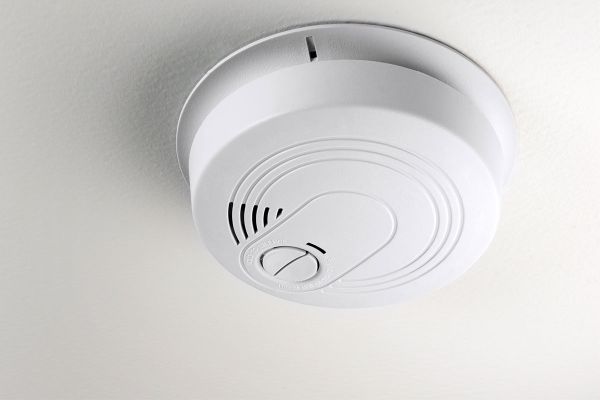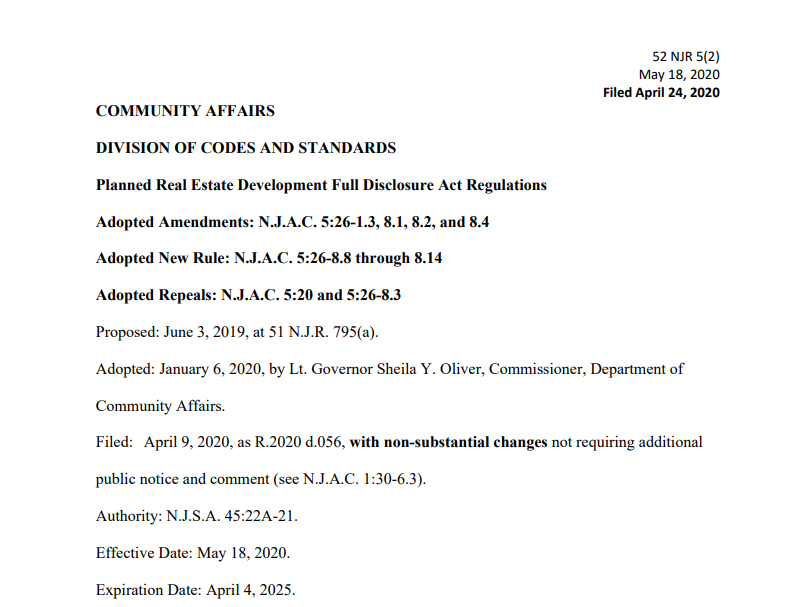
1. REASONS FOR ASSOCIATION RULES AND REGULATIONS
a) PRESERVATION AND ENHANCEMENT OF PROPERTY
Developers prepare and implement rules and regulations in an effort to, among other things, preserve the value of the homes in the community. This is the basis for many architectural rules and regulations. Since many community associations involve high density housing, developers and governmental planners have used rules and regulations in an effort to avoid the problems suffered by non-association high density housing.
Among other things, non-association high density housing problems involve the wide range of care and maintenance provided by the individual home owners and the wide range in taste with respect to painting, decorating and landscaping properties. Rules and regulations provide a framework which standardizes the level of maintenance and the look of the homes. With a set of rules and regulations in place, purchasers can expect the community’s physical attributes to remain similar to what they were when they purchased their homes. Rules and regulations provide a mechanism for purchasers to enforce a certain look and level of home maintenance, thereby preserving the property values throughout the community.
b) PRESERVATION AND ENHANCEMENT OF COMMUNITY HARMONY
Complimentary to preservation and enhancement of the physical property is the idea that rules and regulations also preserve and enhance community harmony – relationships between home owners. An association would be hard-pressed to maintain property values if the only power it had was the power to designate the color of the homes and the type of landscaping.
Importantly, associations also have the power to regulate relationships between unit owners and between unit owners and the association. These rules and regulations run the gamut in most associations. They vary from regulation of noise to keeping of pets to maintaining recreational equipment outside of units to conduct in the swimming pool to parking and driving regulations.
This type of rules and regulations regulate how people are to act while they are in their units or upon association property. This is an important facet of maintaining property value in high density housing. Many people of varying backgrounds and lifestyles choose to live in close proximity to one another. Because of the differing backgrounds and lifestyles and close proximity, without settled rules and regulations, friction could lead to unbearable living conditions. In a city, municipal regulations regulate people’s conduct. Municipal regulations also apply to community associations however, though enforceable, they are generally not the number one priority for municipal enforcement. Police forces can hardly be expected to quickly respond to calls regarding people playing loud music when they are responding to calls involving threats to health, safety or property.
Association rules and regulations provide the tools for managing unit owner conduct on a scale that is manageable by the association’s Board of Trustees, management company and attorneys. These relational type rules and regulations and their conscientious enforcement may provide as much impact on property values as the impact of rules and regulations directed toward preservation and enhancement of property.
c) NEW RULES AND REGULATIONS
At one time or another, most people have been told that the “squeaky wheel gets the grease”. This is no different in the community association field. In many associations, especially more mature ones, home owner apathy allows a few interested and active individuals to provide the majority of input on how the association is run. This is often advantageous because these individuals are usually community-minded and will work with the association’s management and attorneys to maintain property value and amicable unit owner relations. However, there are times when personal agendas are advocated and adopted to the detriment of the association as a whole. There are also times when an association’s board is bullied by one or a few outspoken homeowners and the board gives into these demands.
Boards should be cautious not to accept suggestions for new rules and regulations solely because they are strongly advocated by one or a few individuals (the ‘squeaky wheels’). Instead, whether formally or informally, the association’s board should attempt to determine other association members’ feelings on the proposed rules and regulations. This avoids the situation where a small group of zealous advocates champion new rules and regulations, the new rules and regulations are adopted, and the ‘silent majority’ erupts with extreme hostility and disfavor. Rule and regulation creation and implementation without association input has lead to turnover of entire well functioning boards under the wrath of a no longer silent majority. Unfortunately board members in this position are often surprised and disappointed because they were acting in good faith and they thought they were doing what the people wanted. Turnover of a board causes instability which often leads to difficulty in managing and representing the association. Communication and investigation prior to rule and regulation creation and implementation is critical.
Failure to gain association consensus on proposed rules and regulations may also lead to divisiveness on the board. Without consensus, a single board member may split from the board and advocate against the remaining board members. While debate among board members is healthy, divisiveness impairs the board’s ability to get work done and function on a day-to-day basis. Rather than the board polarizing, consensus should be worked toward in creating and implementing new rules and regulations.
Unfortunately, obtaining community consensus and feed back is difficult. Informal surveys are thought to be less accurate and less reflective of the true feelings of association members. However, formal opinion surveys/referendums can do more harm than good because rules or regulations that may “need” to be implemented may not receive a majority of votes in a formal survey. Then, home owners are naturally inclined to believe that, since the proposed rules and regulations did not receive a majority vote, the new rules and regulations are not going to be implemented. This is contrary to the function of the board. The board, as a representative body, knows the day-to-day workings of the association, its management company and attorneys generally have an awareness of the need for the rules and regulations. What may seem unwise upon superficial review by a non-participating homeowner may, from the board’s perspective, be critical for the proper functioning of the association.
We generally advise against performing surveys on proposed rules and regulations but do advise that the board notify the association of the proposed rules and regulations through a news letter or otherwise to attempt to obtain the community’s feelings on the proposed rules and regulations. This may be combined with open discussion at meetings prior to rules and regulations adoption.
2) SOURCE OF RULES AND REGULATIONS
a) STATUTE
Rules and regulations in community associations arise from a number of sources. Among numerous other statutory provisions, the Condominium Act appears atN.J.S.A. 46:8B-1 et. seq. and the Cooperative Recording Act at N.J.S.A. 46:8D-1 et seq. Homeowners’ associations are generally left to the provisions in the deed of restrictive covenants with provisions from other statutes being applied by analogy. The Community Association Institute is advocating passage of a single statutory framework for community associations: The Uniform Common Interest Ownership Act. The hope is that the Uniform Common Interest Ownership Act will provide a standardized statutory basis for all forms of common ownership of real property in New Jersey and thereby provide a clearer basis for administering common ownership associations.
b) GOVERNING DOCUMENTS
Regardless, most association rules and regulations are not derived from statute but, are generally outlined in the association’s deed of restrictive covenants or master deed. Generally these documents empower the association’s board to create and enforce rules and regulation for the common property and residents’ conduct within the association. So long as the rules and regulations are implemented pursuant to the association’s governing documents, they are generally upheld. However, the other source of rules and regulations is case law.
c) CASE LAW
Case law generally arises when the association and a unit owner become involved in a suit over implementation or enforcement of a certain rule or regulation. Generally either a statute, rule or regulation is not one hundred percent clear or the facts are such that they do not fit exactly with the statute or regulations. To resolve a dispute, the court will look to statute, the association’s governing documents and decisions of past courts to form an opinion as to whether the particular rule or regulation and the enforcement of such rule or regulation is valid.
Once a court decision has been rendered on a particular rule and regulation, that decision comes into play in considering enforcement of the subject rules and regulations in future cases with similar facts. The decision may even bind the association with respect to future rules and regulations. This was demonstrated, to the chagrin of many associations, when the court in Walker v. Briarwood Condominium Association, 274 N.J. Super. 422 (App. Div. 1994) struck down an association’s ability to impose fines for violations of rules and regulations and the court in Holbert v. Great George Village S. Condominium Council, Inc., 281 N.J. Super. 222 (Ch. Div. 1994) struck down an association’s ability to impose late fees. Note that both of these court cases were statutorily overruled by passage of the amendments to the condominium act. See, N.J.S.A. 46:8B-15(e) and (f).
3. NOTICE OF RULES AND REGULATIONS
a) GENERALLY
Notice of rules and regulation may be provided in a number of ways. First, individuals are generally put on actual notice of rules and regulations by receiving a copy of them at the closing of the sale of their home or by receiving a copy when the rule or regulation is passed. The purchaser’s closing attorney should have reviewed all rules and regulations in the governing documents and otherwise with the purchasers. However, this is often not done and, though copies of the governing documents are received, they are never reviewed. Upon enforcement, many claim that they never heard of the rule and regulation.
If the governing documents containing the rules and regulations and/or separate rules and regulations are recorded in the County Clerk’s office, the home owner is bound by the rules and regulations through constructive notice. With constructive notice, individuals purchasing real property are conclusively presumed to have notice of documents affecting their real property that are on file with the County Clerk’s office even though they may have never read the documents. See, Camp Clearwater, Inc. v. Plock, 59 N.J. Super. 1 (App.Div. 1959). Since master deeds and deeds of restrictive covenants are filed with the County Clerk’s office, property owners are bound by the rules and regulations contained therein. See, N.J.S.A. 46:21-1.
However, the general rules and regulations outlined in the master deed and deed of restrictive covenants often do not fit the day-to-day needs of the association closely enough and the association’s board is often required to implement rules and regulations within the scope of the master deed and by-laws that better fit the day-to-day operation of the association. These rules and regulations are, so long as they are within the scope of the provisions of the master deed and by-laws, passed by a resolution and should be kept in a resolution book that is held by the association’s manager and is open for review by homeowner owner or potential homeowner. Additionally, many property managers provide a summary rule and regulation booklet that advises homeowners of all specific rules and regulations (this summary should be distributed with the closing package). This is wise because it highlights the rules and regulations before an actual breach.
b) RECORDATION REQUIRED
While it is not necessary to record every rule and regulation in the Clerk’s office, it is wise to record rules and regulations which will significantly affect the lifestyle of the homeowners (i.e., banning of pets) or would significantly affect the unit owners’ ability to deal with their property or the common property (i.e., regulations relating to installation of decks). These two types of rules and regulations must be addressed very carefully. They must be recorded because the association will want to have the benefit of the conclusive presumption that home purchasers are aware of the rule and regulation.
Prior to implementation, the board must also have these types of proposed rules and regulations carefully reviewed by the association’s management company and attorney. This is so because rules and regulations which will significantly affect the homeowner lifestyle or the homeowner’s ability to deal with their property may require amendment to the master deed and/or the by-laws. This generally requires a solicitation and vote of all homeowners.
Further, the proposed rule may so significantly affect the lifestyle of the unit owners or the unit owners’ ability to deal with condominium property that the rule works a “change in a unit” such that, statutorily, the proposed regulation requires an affirmative vote of every unit owner. This is required by the Condominium Act at N.J.S.A. 46:8B-11 which provides that “unless otherwise provided therein, no amendment shall change a unit unless the owner of record thereof and the owners of record of any liens thereon shall join in the execution of the amendment or execute a consent thereto with the formalities of a deed.” This is supported by the New Jersey Supreme Court’s decision in Thanasoulis v. Winston Towers 200 Association, 110 N.J. 650 (1988). InThanasoulis the Court determined that a regulation passed by the association’s board which charged non-resident unit owners higher monthly parking fees than those charged resident unit owners constituted a proscribed “change in a unit” and therefore could not be affected without the unit owner’s consent. In the Matter of 560 Ocean Club, L.P. 133 B.R. 310 (Bkrtcy. D.N.J. 1991) the court determined that the association’s attempt to pass a regulation which proscribed short term leases constituted a “change in a unit” requiring the consent of each homeowner. “Change in a unit” is not defined in the statute but the New Jersey Supreme Court has said “we assume that the legislative intent was that a unit owner should retain essentially the same property rights originally deeded to him for as long as he owns his unit unless he affirmatively consents to them being altered”. Thanasoulis, 110 N.J. at 663. The Thanasoulis court described the parking space as a vital component of the unit and held that the revised parking rules had the effect of confiscating a portion of the property interest the unit owner acquired when he purchased the unit, thereby denying him economic value of a portion of his unit. Whether a rule or regulation ‘changes a unit’ must be evaluated on a case by case basis. However, any time a proposed regulation may change the property rights originally deeded to the unit owner, the Board should evaluate whether it will be able to obtain the consent of all unit owners. This would likely be the rare instance. Recordation of rules and regulations which significantly affect lifestyle or use of a unit is required. However, these significant rules and regulations must be carefully evaluated because special procedures may be required for their implementation.
4. ENFORCEMENT OF RULES AND REGULATIONS
In most cases, rules and regulations are complied with after a simple notice from the management company. However, at times, unit owners are recalcitrant. This involves enforcement through other means.
First a notice is sent to the homeowner to remedy the violation with an indication that the homeowner may seek alternate dispute resolution. If the homeowner chooses alternate dispute resolution, the homeowner meets with the alternate dispute resolution committee or individual and the dispute is typically mediated. The Committee then makes a recommendation as to resolution. The board then makes a decision with respect to enforcement in light of the alternate dispute committee’s recommendation.
If the required compliance is not met by the unit owner, the association’s board may then institute a fine for singular violations or a number of fines for a continuing violation. See, N.J.S.A. 46:8B-15(p). Fines should be collected in the same fashion as any other homeowner assessment.
The association, after consultation with its attorney, may also take self-help measures. The association may have the ability to correct the violation and charge the homeowner for the expense involved in the correction. The association’s attorney must be consulted when considering self help as property ownership and control issues arise as do problems regarding breach of the peace. Further, self help may become expensive and the association should, if possible, avoid becoming a significant creditor.
Compliance with the association’s rules and regulations may also be enforced through injunctive actions. Injunctive actions involve the association’s attorney requesting that the court issue an order requiring the homeowner to do or not to do something. The problem with seeking injunctive relief is that attorney fees become very expensive, requiring numerous hearings and significant time in preparation of detailed witness certifications. Generally, injunctive relief actions are reserved for significant rule and regulation violations, emergency requests, where quick relief is necessary or where a unit owner is “judgment proof” that is, where a unit owner does not have the funds the pay fines even if a judgment were entered. An injunction or court order will compel the homeowner to comply where the pressure of fines may not. In cases where a homeowner is judgment proof, the action for injunctive relief may be followed by a foreclosure action to dispossess the homeowner and motivate the mortgage company to foreclose. Again, this is costly and time consuming.
a) FIDUCIARY DUTY
It is a board’s Fiduciary duty to enforce association rules and regulations. This is an important consideration which is often overlooked in the enforcement process. Usually the violating person argues why they should be permitted to continue the violation or be given some type of special allowance. Rarely does the association’s board highlight the fact that every other unit owner purchased and continues to maintain their homes in reliance on the association’s governing documents which include the rules and regulations. The value of maintenance of the rules and regulations should be reflected in the value of the home. Therefore, if the association’s board fails in its fiduciary duty to enforce the rules and regulations, the association’s board may be subject to suit by the non-violating homeowners for failure to enforce rules and regulations. It is very important that board members keep in mind that it is their affirmative duty to enforce the rules and regulations.
b) REASONABLENESS IN APPLICATION
Keeping in mind that it is the fiduciary duty of the board to diligently enforce the rules and regulations of the association. This is balanced by the “reasonableness” factor that it is imposed by case law in New Jersey. Essentially, courts have read into association rules and regulations a reasonableness factor whereby the association, while maintaining enforcement of its rules and regulations, must do so reasonably. See, Billig v. Buckingham Towers Condominium Association I, Inc., 287 N.J. Super. 551 (App. Div. 1996).
The reasonableness test is whether the interests of the unit owners as a whole are served, advanced or protected by the board’s action. If so, the regulation will likely be determined to be reasonable, if not, the association may have to give deference to the unit owner desires. This reasonableness standard helps avoid draconian imposition and enforcement of rules and regulations. It further recognizes that, though rules and regulations may appear perfectly suitable on paper, their application often involves consideration of factors that were not considered during the drafting and implementation process. The reasonableness requirement speaks to application of rules and regulations in the daily living of homeowners and the good faith application of these rules and regulations.
c) FAILURE TO ENFORCE
Most, if not all, association governing documents contain a provision which specifies that, if the association’s board’s fails to enforce rules and regulations, such failure to enforce will not work as a waiver, release or estoppel against the association enforcing these rules and regulations at a later date. This is important because in other contractual arrangements, if a party fails to enforce a certain provision, the person that the regulation is being enforced against can claim waiver, release or estoppel and may successfully overcome enforcement of the regulation. Association living is an arrangement involving more than a mere one on one contract. It is a mutual relationship among homeowners and between the homeowners and the association (essentially, a small form of government). It is important that associations always take the position that, even if a certain rule or regulation was not previously enforced, the board may enforce it in the future and past non-enforcement will not be considered a waiver, release or estoppel.
d) ATTORNEY FEES FOR ENFORCEMENT OF RULES AND REGULATIONS
Most governing documents provide for collection of “reasonable” attorney fees if the association is required to take legal action to collect association assessment and fees. However, many documents do not provide for the association collecting its reasonable attorney fees expended in efforts to compel a unit owner to comply with the association’s rules and regulations. Additionally, most documents also do not contain provisions addressing cases where counterclaims are raised against the association by home owners that the association is seeking to enforce rules and regulations against. Homeowners should be held responsible for the reasonable attorney fees incurred by the association in enforcing its rules and regulations and in defending counterclaims if the homeowner is unsuccessful in prosecuting the counterclaim. Though this is generally untested, associations may wish to attempt to amend their documents to provide for collection of reasonable attorney fees if the association is required to take legal action to enforce its rules and regulations and it successfully defends counterclaims either in collection actions or in suits to enforce rules and regulations. This is important because associations are often compelled to settle cases because of frivolous counterclaims but counterclaims which nonetheless generate insurance claims and non-recoverable attorney fees.
5. EXCEPTIONS TO RULES AND REGULATIONS
Often, though the association has exclusive power with respect to modification of the common elements and association property, as an association matures, members will wish to modify certain portions of the units, or the common elements. This has been seen with respect to the installation of attic fans, installation of satellite antennas, installation of skylights, homeowner maintenance of flower beds, installation of various landscaping modifications, installation of storage sheds and other modifications that somehow affect homes, limited common elements or common elements. While the association should take steps to maximize the use and enjoyment of the community, the association should be very cautious in granting use of and/or modification of property which is outside of that initially contemplated in the governing documents.
If the association does wish to grant these exceptional rights, the association must pass a specific resolution with respect to the particular unit addressing the proposed use. The association must also have the unit owner enter into a separate agreement with the association addressing the modification, and addressing the unit owners and his successors and assigns responsibility for the modification. A copy of a sample agreement is attached hereto as Exhibit A.
Often the association will require a fee for the requested use. It should cover attorney fees for preparation of the various documents as well as the County Clerk’s recording fee. The fee may also include a charge for inspection by the association’s contractor. It is important that these types of agreements are recorded in the County Clerk’s office because they modify rights and responsibilities with respect to the particular unit and not just the particular unit owner but also his successors and assigns (i.e. people who purchase the unit from him, etc.). The unit owner should also provide evidence of insurance and agree to maintain the modification in the future. See exhibit A.











